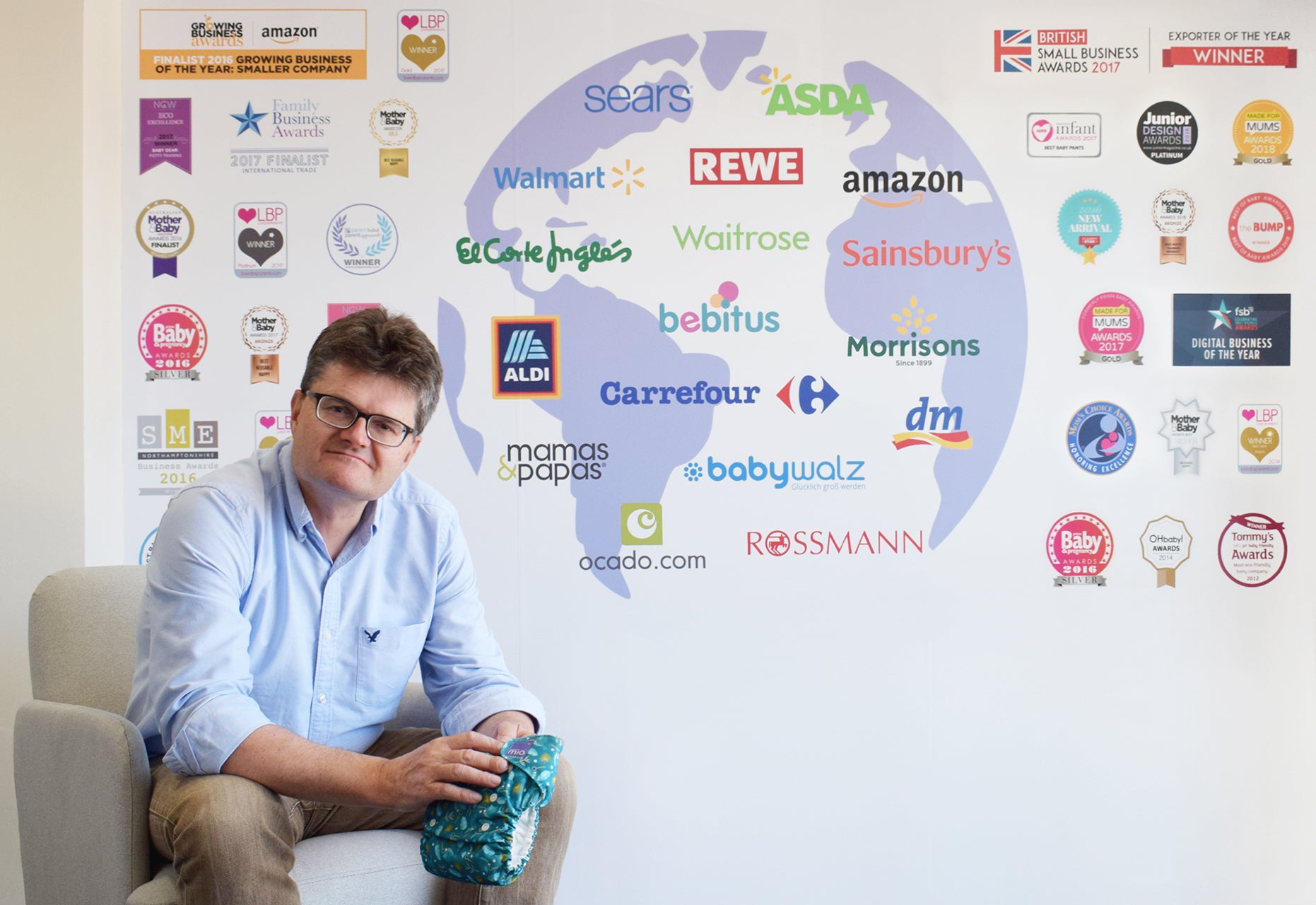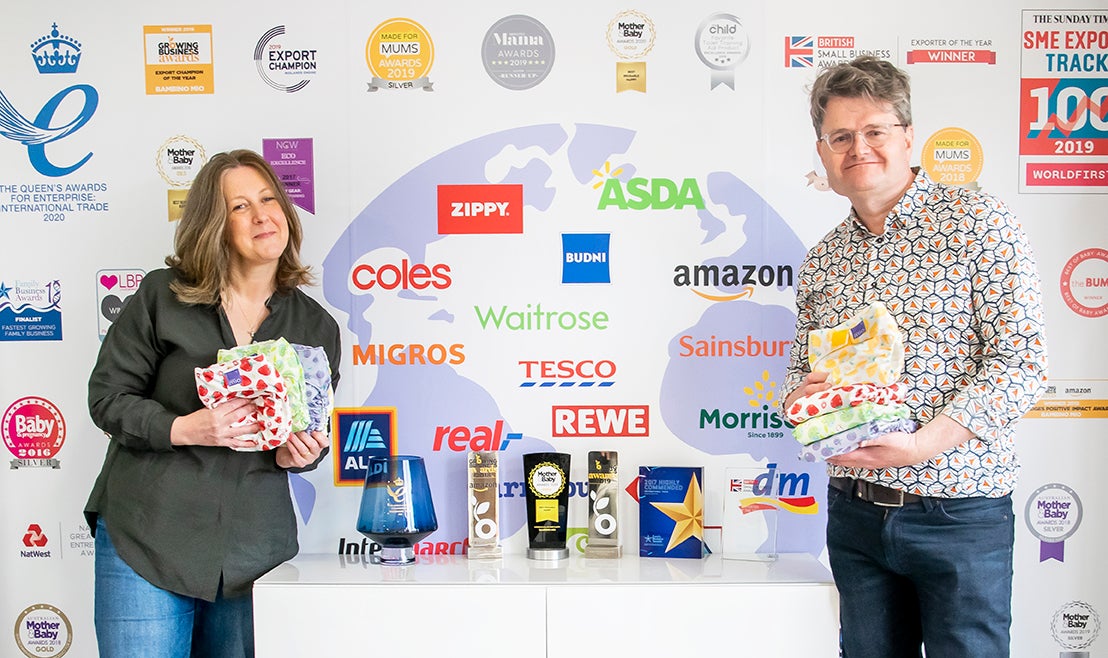How Bambino Mio is trying to make reusable nappies normal
Guy Schanschieff, founder and chief at Bambino Mio, speaks to Andy Martin about standing up against the tide of single-use baby undergarments with his line of washable and reusable nappies


Unpleasant fact No 1: soiled nappies are the third biggest contributor to landfill in this country. Unpleasant fact No 2: Vanuatu in the South Pacific is so choked with used disposable nappies it has banned them. Guy Schanschieff, founder and chief at Bambino Mio, is standing up against the tide of single-use baby undergarments with his line of washable and reusable nappies.
He earned his entrepreneurial spurs as a kid growing up in Northampton, selling fruit and veg at the side of the road. Not only was it all for charity, but most of his customers were simply buying back what they had grown in the local allotment in the first place. In the era before car boot sales, 10-year old Guy then turned his hand to organising jumble sales. And even if that too was for a good cause, he still had a shrewd sense of commercial realities. When one of his buyers drove off with a ton of jumble for a mere fiver, he realised he’d been ripped off. “It’s a good analogy for running a business,” says Schanschieff. “Learning as you go along – mainly from your mistakes. If you get more things right than wrong, you’re a success. But it’s only by trying things out that you can find what works.”
He took business studies at the then Leicester Polytechnic and went on to work for KPMG. When, in 1991, his partner Jo was made redundant at Marks and Spencer he quit his job and they travelled to India, Nepal, Australia and New Zealand, which turned out to be a major turning point for him. Oddly enough, wherever they went, he found that random people would start talking to them about diaper laundry services. “I got a job cutting grass in Australia and I noticed all these nappy laundry vans nipping about the place.”
In 1992, on their return, Guy and Jo started their own nappy laundry business in Northampton. “People thought we were mad,” he says. “Everyone used disposable back then.” It was only in 1997 that they shifted sideways into selling their own kit and Bambino Mio was born. “We realised we could make a high-performing product that looked good too.” The mail-order business gradually took off and soon Bambino Mio was being stocked in Babies R Us and Mothercare. Now it’s among the top 100 fastest growing companies.
All the things we deal with fit with everything society is having to deal with. It’s gone from being fringe to being bang in the centre
Their first nappy was 100 per cent cotton. Now they have a range of different materials, including the recently launched bamboo. “Each has its up and down sides,” says Schanschieff. “Bamboo is incredibly absorbent. Microfibre (cotton) dries very quickly. Everyone can find the nappy that suits them.” He reckons that one nappy will last for one baby or more (which means 5,000 less disposable ones). Guy and Jo tested out their new designs on friends’ kids first – then they had a few of their own. “They were good guinea pigs,” says Schanschieff. “No complaints.”
Naturally, he spoke at Cop26. “All the things we deal with fit with everything society is having to deal with. It’s gone from being fringe to being bang in the centre.” One per cent of all plastic goes into producing nappies. The thing we are apt to forget about the disposable kind is that they are a single-use item, just like coffee cups. But while 2.5 billion coffee cups are thrown away every year in the UK, the number of nappies we dump runs to 3.6 billion. Not too surprisingly, 30 per cent of all non-biodegradable waste is made up of nappies. And they create methane too. For each child, it’s the equivalent of throwing away 17 plastic bags every day.

At the same time the packaging often makes the claim of being eco-friendly and compostable. “They aren’t,” says Schanschieff. “Parents think they are doing what’s right. But consumers are being misled. It’s just greenwashing. And they charge two or three times more for it.” The other point he makes is that all the chemicals that go into making disposable nappies amount to “an experiment on our babies.” His reusable ones are chemical-free and less potentially irritating to sensitive skin.
“I wanted a business I could believe in,” he says. Bambino Mio were a purpose-driven company well before that became a buzzword. They were developing a whole new category of baby kit, not just a brand. Now 70-80 per cent of their production is for export. Germany is a bigger market than the UK.

Schanschieff says he came out of Cop26 feeling “broadly optimistic”. He recalls the comment of one government adviser to the effect that the speed of change, at least at the diplomatic level, is incredible: where previously net zero was an alien concept to most people, now it’s squarely on the agenda. “Anything is achievable,” he says.
Schanschieff reckons he’s “done the entrepreneur bit” – now he has a “founder’s role” at Bambino Mio, trying to make sure that nappies are part of the conversation, alongside plastic bags and coffee cups, especially at the political level. “Only 19-20 per cent of people are using reusable nappies. But word of mouth is a powerful thing. I reckon 19-20 per cent is a tipping point.”
Schanschieff is chair of the Nappy Alliance in the UK, but he is also something of a roving ambassador. Ever since that epic journey that got him thinking about nappies, he’s been conscious of the problem around the world. His travels have taken him in particular to Vanuatu, which is the first nation on earth to pass a law prohibiting disposable nappies. “The problem with single-use products for places like Vanuatu – and elsewhere in the developing world – is that they don’t have the facilities to get rid of them.”
Every single day, a million nappies are tossed into a river in Java. “Companies take no responsibility,” says Schanschieff. “They export the problem into countries that can’t cope.” Meanwhile, back in the UK, local authorites are shelling out around £148m every year disposing of the disposables. “Whether you’ve got babies or not, you’re still paying for it.”




Join our commenting forum
Join thought-provoking conversations, follow other Independent readers and see their replies
Comments